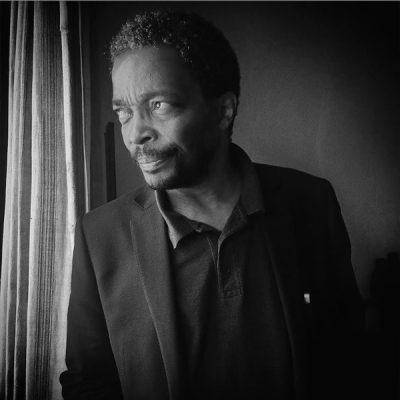Makerere University, Maisha Foundation
Theme:“Should I Take off My Shoes?”
Conductor:Simon Njami
AtWork format was adopted by the Department of Visual Arts of Makerere University and the Makerere Art Gallery, in partnership with Maisha Foundation. Twenty students and recent graduates were involved in a five-day workshop (February 9–13) held for the first time by Moleskine Foundation’s advisor Simon Njami. Participants were invited to question their own identities, express their views on the workshop theme and leave their creative “marks” on the pages of Moleskine notebooks, which were exhibited at the Makerere Art Gallery from March 19 to April 11, 2015.
“A calculated risk is not a risk.”
Stacey Gillian, AtWork Kampala participant
“Should I Take off My Shoes?” evokes the moment in which we enter new unknown territories, inviting us to reflect on the symbolic meaning of “crossing the threshold.” This often requires questioning our identities, our certainties and the way we interact with our surrounding environment. A subversion of our common perceptions and automatic ways of thinking was the central idea of the workshop led by Simon Njami, in collaboration with Katrin Peters-Klaphake, curator of the Makerere Art Gallery, a team of facilitators, and a special guest: the acclaimed film director Mira Nair.
During the first two days of the workshop, participants were hosted by the Maisha Foundation at the Maisha Garden, founded by Mira Nair, who personally met the students and held a debate after the screening of one of her films, “Salaam Bombay”. This was a valuable and rare opportunity for students to exchange views and be inspired by a woman who is an artist, an entrepreneur and, above all, a critically thinking individual. The artistic training provided by the workshop was halfway between formal and informal. It was a break from the routine of the academy, combining traditional teaching with a more dialogic and inclusive approach to learning.
AtWork experience also extended beyond the workshop participants group and became a catalyzer, an event that allowed many protagonists of Kampala artistic and creative scene to come together: there was a talk at East 32° with artist Said Adrus conducted by Simon Njami, as well as meetings and discussions with Kampala Biennale past and future curators.

Photo by Aida Muluneh
Simon Njami is an independent curator, lecturer, art critic, and writer. He is the co-founder and editor-in-chief of “Revue Noire.” Previously, Njami was the artistic director of the Bamako Photography Biennial 2000-2010, and co-curator of the first African pavilion at the 52nd Venice Biennale in 2007. He has curated a number of contemporary art and photography exhibitions, including Africa Remix (2004-2007) and the first African art fair in Johannesburg in 2008. In 2014, The Divine Comedy exhibition, created and curated by him, started a world tour at the MMK (Museum für Moderne Kunst) in Frankfurt, moving on to the SCAD Museum of Art in Savannah and the Smithsonian Museum of African Art in Washington, DC. He is the director of the Pan African Master Classes in Photography, a project created in partnership with the Goethe Institute; artistic director of the Donwahi Foundation (Abidjan, Ivory Coast); adviser to the Sindika Dokolo Collection (Luanda, Angola); secretary of the special jury of the World Press Photography Awards; artistic director of the first edition of Off Biennale (Cairo, 2015) and the 2016 Dak’Art Biennale (Dakar, Senegal), the first and most important artistic event in Africa.
“We need people who are not only artists, but thinkers. Some are already out there. We need to see the new generation.”
Simon Njami, AtWork Kampala leader
During five days of research, sharing, exchange and creativity, participants metaphorically and literally took off their shoes to explore notions, spaces and territories, where they have not previously ventured. In this five-day “collective psychodrama” (as Simon Njami referred to it), the individual identity of all participants emerged. They started asking themselves questions and looking for answers, opening up their minds and creative channels. They realized that to be an artist you have to be a thinker and, above all, a human being. The workshop experience was then narrated, among others, by Gloria Kiconco, a young writer who participated in AtWork Kampala and decided to share with us her answer to the question “Why Africa?”, published by Doppiozero.
“Made me think greatly about who I am and who I want to be… Thank you for a new mind.”
Immy Mali, AtWork Kampala participant
“In only 5 days I have found myself, I became a risk taker, a rule breaker, I created a rebel.”
Miriam Namutebi, AtWork Kampala participant
This experience is described in the third chapter of the booklet. The selected texts reflect both the general vision of AtWork and the particular context of Kampala. It is a heterogeneous series of contributions, including a utopian essay by Simon Njami, entitled “Fictional Faculties,” focusing on the ideas that guided and inspired the workshops; a conversation between Lilian Nabulime, George Kyeyune and Katrin Peters-Klaphake; an interview with Mira Nair; and a contribution by participant Gloria Kiconco, who answered the question “Why Africa?”
“Memory is a serious fiction.”
Simon Njami, AtWork Kampala leader